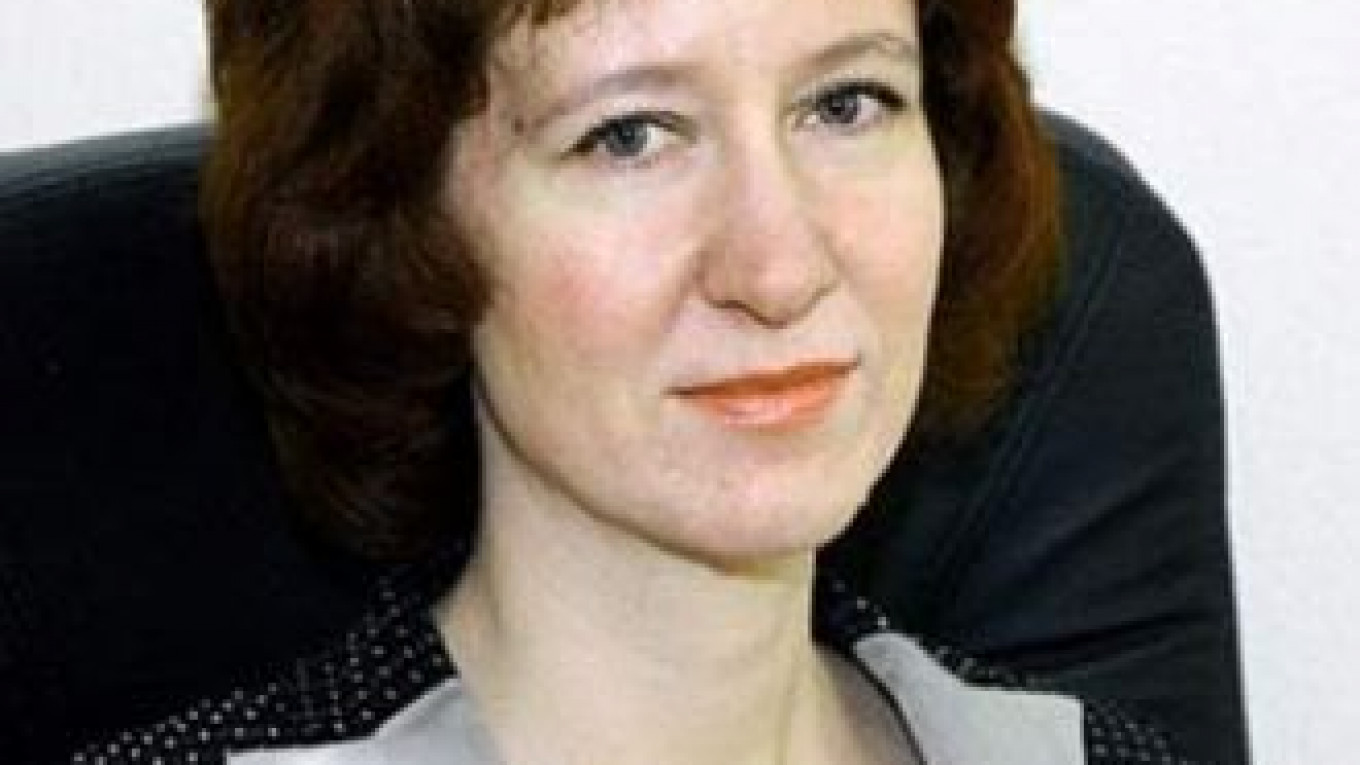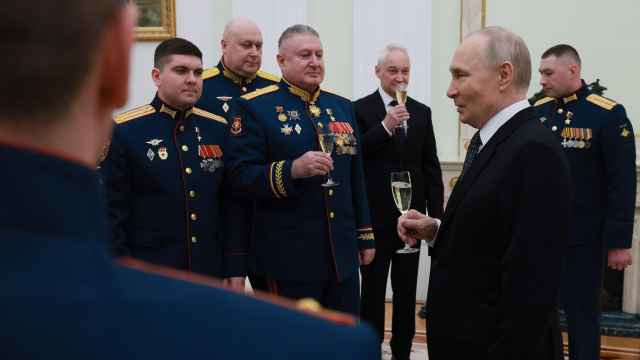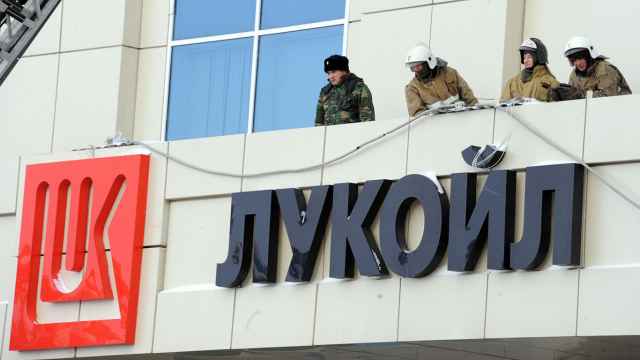Alexei Kudrin's ouster as finance minister left a big hole in the leadership of the Finance Ministry.
But Kudrin isn't the only senior official whom the ministry has lost in recent weeks. A 37-year-old deputy finance minister viewed as one of Russia's top macroeconomists died of cancer less than a month before Kudrin left.
Oksana Sergiyenko, who played a key but little-noticed role in the 2004 creation of the federal stabilization fund, showed a rare talent for numbers and was motivated by a Protestant faith in God — a rare combination that drew hostility in some circles and unsubstantiated allegations that she was on the payroll of U.S. intelligence.
Kudrin — fired by President Dmitry Medvedev on Sept. 26 amid differences over government spending — will perhaps be best remembered for his bulldog determination to put revenues from high oil prices in the 2000s into the stabilization fund.
But the person responsible for drafting the fund's paperwork was Sergiyenko.
"She was one of the main drivers of the stabilization fund," said Valentina Boitsova, a senior economist and department deputy head with the Finance Ministry, who worked closely with Sergiyenko. "She prepared all the paperwork."
Sergiyenko's brother, Alexei, said his sister believed passionately in the fund and worked night and day for weeks on its creation.
"She prepared all the documents — that I remember clearly," said Alexei Sergiyenko, a financial markets analyst with Sberbank. "Around seven years ago she wrote a complete defense for the creation of the fund — why the stabilization fund was needed and how it was going to be spent."
Remarkably, Oksana Sergiyenko found inspiration to help create the fund in the biblical story of Joseph, who as the interpreter of Pharaoh's dreams came up with the idea to store windfall grain for an unforeseen lean period, her brother said.
Sure enough, Russia's lean times arrived with the 2008 recession. Suddenly everyone in the government — including populists who had ridiculed Kudrin for not spending the money as it flowed in — rejoiced that more than $200 billion had been stashed away. Kudrin received praise from government officials around the world for his farsightedness. Scarcely a word was uttered about Sergiyenko's role — and apparently she liked it that way.
"She never wanted praise. She only wanted to make things easier for Kudrin and the other leaders," said her mother, Larisa Sergiyenko, a retired economist.
But Oksana Sergiyenko wasn't always like that.
Born on March 19, 1974, in Dushanbe, Tajikistan, Sergiyenko grew up a proud and ambitious child who was always reading, her mother said. Her grade-school teachers in Tashkent, where she later moved with her mother and younger brother, Alexei, were so impressed with her grasp of her studies that they asked her to teach for them sometimes, she said.
"She didn't have a childhood," her mother said. "I had a childhood. Alexei had a childhood. But she only studied and studied and studied. I would ask her, 'Oksana, what's the point?'"
Sergiyenko, an avowed atheist, had one goal: to be first, as she acknowledged in subsequent interviews.
After graduating with a degree in economics from the Tashkent Institute of Architecture and Civil Engineering in 1996, she set her sights on Moscow.
Sergiyenko and her brother arrived with no money or place to stay. They first lived in a room of a friend's apartment and later moved into a dormitory while Sergiyenko completed graduate work in economics at the Institute of World Economy and International Relations with the Russian Academy of Sciences.
Times were tough. Alexei Sergiyenko recalled how they sometimes lived for a week on a single loaf of bread. Some days they ate nothing. It was during that year — the most difficult and miserable in her life, her brother said — that Oksana Sergiyenko desperately turned to God.
Oksana Sergiyenko explained in a January 2010 interview that she began reading the Bible that year and found exactly what she needed within its pages: "the secret to happiness."
"When I met God, He showed me a completely different way of life," Sergiyenko said in the interview with 3ABN Russia, a Seventh-day Adventist television channel. "He said it is better to give than to receive. … When I began … to give rather than to receive, I began to receive incomparable blessings."
One of those "blessings," her brother said, was in finding work. Determined to find a job that wasn't routine, Sergiyenko called the three government agencies where she felt that she could best put her skills to use: the Central Bank, the Economic Development and Trade Ministry and the Finance Ministry, he said. The Finance Ministry invited Sergiyenko to come in for an interview and offered her an entry-level job with a salary of $100 a month in 1999.
But Sergiyenko didn't care about the money — an outlook, her brother said, that kept her from taking bribes and engaging in other forms of corruption. In fact, if money was a factor, she could have easily secured a well-paid job as an economist at a private bank, he said.
Sergiyenko quickly rose through the ranks. It seemed to her mother that she slept only two or three hours a night.
"She worked all the time, at home, in the car, she was always working," Larisa Sergiyenko said. "She seemed to be working for her whole department. We would say to her, 'You are supposed to lead the department, and you are doing all the work.'"
The awards began to flow in as Sergiyenko, who never married, sought to modernize the country's financial strategies. Her mother — speaking in an interview in the Moscow apartment where she recently moved after being asked to vacate the government dacha that her daughter had shared with her — showed a reporter a collection of framed letters of appreciation from Vladimir Putin and Kudrin and a letter signed by Security Council chief Nikolai Patrushev recognizing Sergiyenko's contribution to national security. In 2007, then-President Putin decorated Sergiyenko with the Medal of the Order for Service to the Fatherland, second rank.
Putin promoted her on Sept. 25, 2008, to the post of deputy finance minister, responsible for drafting the state's long-term fiscal policy and comprehensive macroeconomic models.
Boitsova, the Finance Ministry official, described Sergiyenko as a tough but kind leader. "She was very demanding and very attentive to detail," she said by phone. "She helped people grow, both professionally and personally. We miss her terribly."
Sergiyenko also practiced her faith at her workplace — an overlap that stirred animosity in a country where the Russian Orthodox Church is the dominant religion and Protestants are often denounced as members of a sect.
Sergiyenko chose the Adventists over Orthodoxy based on her reading of the Bible, deciding that their observance of a Friday-to-Saturday Sabbath was more faithful to the 10 commandments, and they put a higher priority on biblical teachings than church traditions, her brother said.
Last year, the Vek newspaper an article titled "A Preacher for Kudrin" that, citing unidentified ministry sources, accused Sergiyenko of spending more time promoting God than engaging in government work.
"According to sources in the Finance Ministry, prayers, religious seminars and Bible studies are held weekly in Sergiyenko's office," said the report, published on Jan. 19, 2010.
"In the breaks between these activities, if there is time, the ministry officials work on budget planning," it said.
The newspaper also darkly suggested that Sergiyenko might be on the payroll of American spies who wanted to damage Russia's national interests — an allegation from some Russians who regard Protestantism as a set of beliefs imported from the United States.
It is unknown how many senior government officials might belong to minority faiths, and religious experts contacted for this article were reluctant to give an estimate. On the regional level, government officials are sometimes open about their faith, with Buryatia leaders, for example, practicing Buddhism, and Chechen leaders practicing Islam. In the federal government, leaders like Putin and President Dmitry Medvedev regularly attend Russian Orthodox services on holidays. But few officials on any level of government are known to actively share their beliefs with others.
Sergiyenko did gather a group once a week in her office — an activity that she publicized within the ministry and elsewhere. But she denied the other Vek allegations and insisted that she had not violated the law.
Indeed, the Vek report conceded that the Constitution and other laws guarantee the rights to freedom of conscience and freedom of religion. The report instead questioned Sergiyenko's priorities at work and whether she was an influence for good in the country.
There is no law in Russia that forbids discussing religious beliefs at the workplace, although State Duma deputies this year reviewed legislation at the committee level that would restrict proselytizing in and out of the workplace.
Media outlets, meanwhile, republished the damaging Vek article, and several Duma deputies asked the Prosecutor General's Office to open an inquiry.
Prosecutors ultimately cleared Sergiyenko of wrongdoing.
When Sergiyenko was hospitalized for the last time in June, the Finance Ministry promoted Alexei Lavrov, who had worked at the ministry since 1998 and in the presidential administration before that, to fill her position, according to information published on the ministry's web site.
Sergiyenko passed away on Aug. 30.
The Finance Ministry praised Sergiyenko as "one of the top macroeconomists in the country" in a brief statement announcing her death.
"It's hard to believe that she's gone," the statement said. "There was no kinder, more charming and more talented leader than her."
A Message from The Moscow Times:
Dear readers,
We are facing unprecedented challenges. Russia's Prosecutor General's Office has designated The Moscow Times as an "undesirable" organization, criminalizing our work and putting our staff at risk of prosecution. This follows our earlier unjust labeling as a "foreign agent."
These actions are direct attempts to silence independent journalism in Russia. The authorities claim our work "discredits the decisions of the Russian leadership." We see things differently: we strive to provide accurate, unbiased reporting on Russia.
We, the journalists of The Moscow Times, refuse to be silenced. But to continue our work, we need your help.
Your support, no matter how small, makes a world of difference. If you can, please support us monthly starting from just $2. It's quick to set up, and every contribution makes a significant impact.
By supporting The Moscow Times, you're defending open, independent journalism in the face of repression. Thank you for standing with us.
Remind me later.






